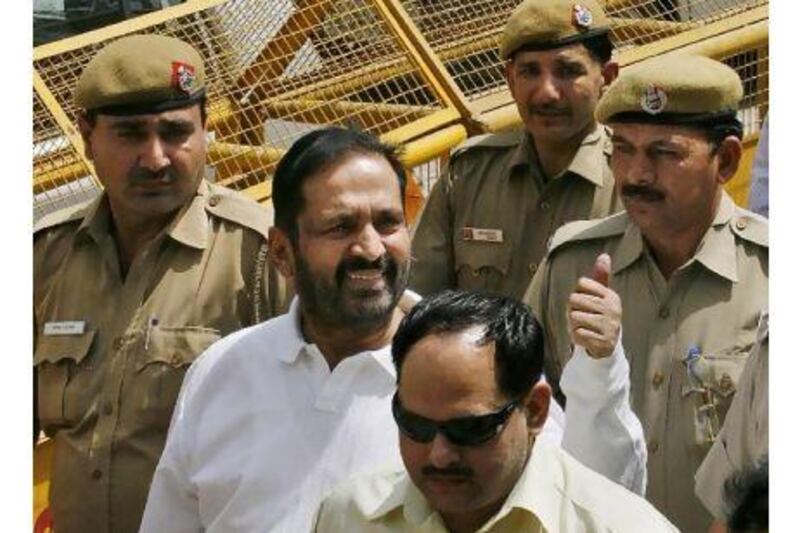Has it not been for Anna Hazare, a 71-year-old social activist who was once a soldier in the Indian Army, Suresh Kalmadi's vice-like grip on Indian Olympic sport might still have been intact.
The Commonwealth Games in Delhi last October were not a complete fiasco only because a desperate government stepped in to save face.
The organising committee, which Kalmadi headed, had done a poor job, with preparations weeks and even months behind schedule.
Amid widespread accusations of corruption and favouritism - par for the course when a big contract is awarded in India - the public became aware of the extent of the problem only when disgusting pictures from the incomplete games village were leaked to the media.
Lalit Bhanot, Kalmadi's right-hand man, compounded matters by saying that western standards of hygiene were different, implying that squalor suited Indians fine.
In the euphoria that followed a record medal haul, much of what went before was forgotten.
Kalmadi's best hope of clinging on to power was for public memory to be short, and for the media to look into the corruption and inefficiency of government departments that had been equally culpable.
A series of high-profile scandals led to Hazare beginning what he has called a "fast unto death" to pressure the government to act on corruption.
And then Kalmadi's luck ran out. The 2G scam that implicated a number of prominent politicians, businessmen and even media people brought home to many, especially a growing middle class, just how rotten the core of the system was.
Even before Hazare's fast, it was clear that the government was being backed into a corner.
In a country where two Cs, cricket and cinema, dominate discourse, a third - corruption - was suddenly on the tip of every tongue.
There will be little sympathy for Kalmadi either. He epitomised the politician-old boy networks that have prevented Indian sport from making a China-like leap into modernity.
While the much maligned Board of Control for Cricket in India is privately run as opposed to most other sports, it has overseen India's rise as a cricket power while others have stagnated.
Big strides have been made in boxing and shooting, but the facilities available for most top-level athletes not cricketers remain deplorable.
Kalmadi's 15 years in charge of the Indian Olympic Association were marked by the usual charades - more delegates and officials for games than athletes - and a complete lack of transparency.
Getting rid of him should only be a start, though, with a number of unprofessional dinosaurs still at the helm of various associations.
The football association forced Bob Houghton to resign after nearly five years at the coaching helm.
Despite disgraceful attempts by officials to brand him a racist, his players backed him, with Sunil Chettri tweeting that he could not thank him enough. Indian fans will remember him with a measure of fondness.
The Nehru Cup was won in 2007 and 2009, and success in the 2008 AFC Challenge Cup gave India a place in the Asian Cup for the first time since 1984. That they lost all three games in a strong group last January almost didn't matter.
Jacob Martin case indictment of yesterday
With the exception of the diehards that follow domestic cricket, few Indian cricket fans will remember Jacob Martin.
Between 1999 and 2001, the right-handed middle-order batsman played 10 one-day internationals, with three scores in the 30s as good as it got.
Like several others, he was thrown in at the deep end and asked to swim, playing all those games away from familiar home conditions.
A stalwart of the Baroda side for nearly two decades, he signed off with 25 in his final game just 16 months ago.
On Tuesday night, he was arrested for his role in a human-trafficking case that dates back to 2003.
It involved a bogus team, Ajwa Sports Club, and fake passports given to a few men masquerading as cricketers touring the United Kingdom.
One of them, Nimesh Kumar, confessed that Martin and an associate had been paid 700,000 Rupees (Dh 57,867).
The story will be forgotten by next week, even if Martin ends up going to jail. But it shouldn’t be.
Anyone who talks of too much money in cricket and the Indian Premier League should look at the Martin case.
This was a man good enough to play for India. Had he been born a decade later, he would have been taking home a massive pay cheque for a mere six weeks of Indian Premier League action.
The league pays millions of dollars to secure the services of some of the best players in the world and even the most junior of players, uncapped ones at that, bank 3,000,000 Rupees from a season’s work.
An IPL salary cannot guarantee that a Martin-like incident will not happen again, but what it does do is drastically reduce the temptation to flirt with the dark side.
Whether it is an illegal bookmaker or an unscrupulous travel agent, it would take one heck of an inducement to convince a player to forsake richly buttered bread.





